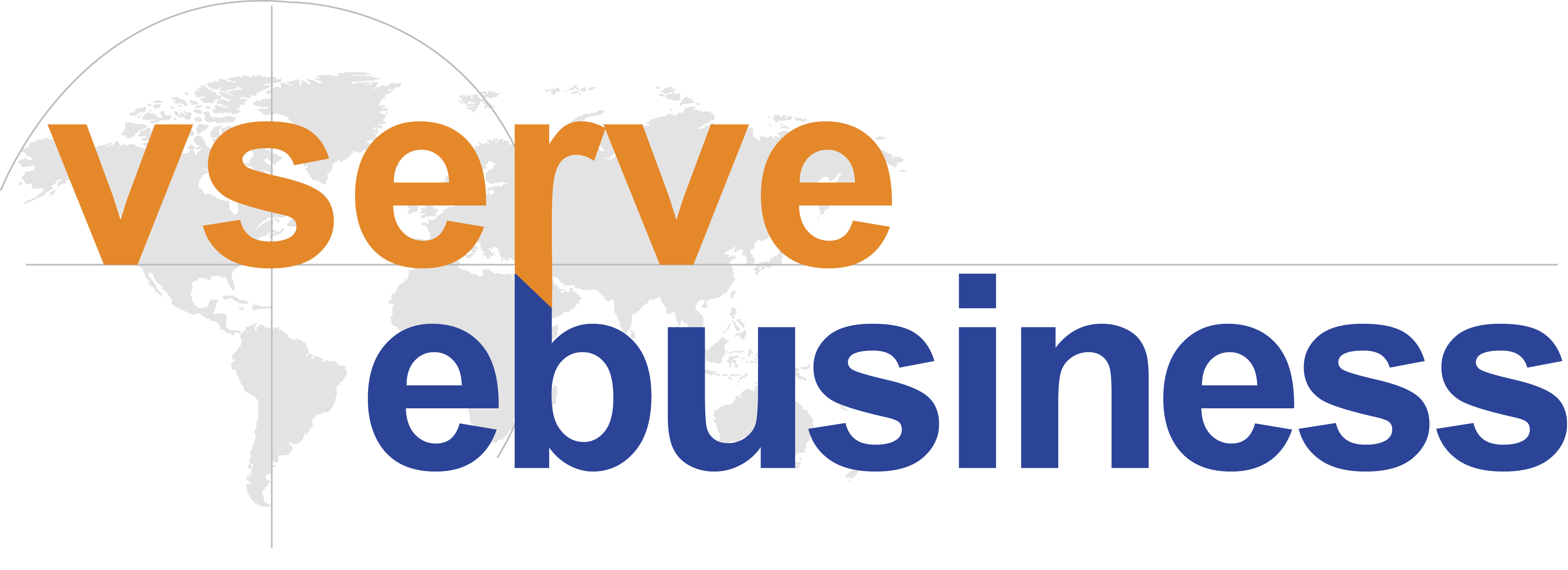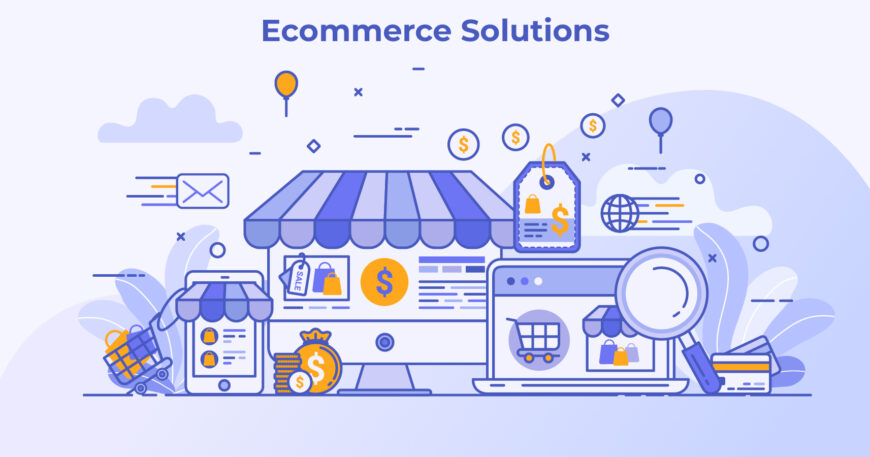Last updated on August 11th, 2025
Global ecommerce is booming, and sales are expected to hit $7.5 trillion by the end of 2025. But here’s the thing: just being online isn’t enough anymore. Small businesses must pick the right tools to stand out. That’s where ecommerce solutions come into play.
Today, customers shop from phones, social media, and even voice assistants. Add in AI-driven personalization and mobile-first design, and suddenly your ecommerce platform is more than just a digital shelf—it’s the engine of your business.
So, what are your options?
Table of Contents
Understanding the Popular Choices in ecommerce development solutions:
Exploring SaaS vs. Open-source Options
Platform Spotlight: SaaS Platforms
Platform Spotlight: SaaS Platforms with CMS Functionality
Platform Spotlight: Open-source Platforms
Understanding the Popular Choices
There’s no one-size-fits-all when it comes to ecommerce solutions. The top 10 platforms we’ll explore offer a wide range—from quick-start website builders to customizable enterprise tools.
Popular doesn’t mean best—it means used, trusted, and tested. According to market share reports, Shopify, WooCommerce, and Magento lead globally. But niche players like Kentico and Weebly still win for simplicity.
Quick Comparison Table
|
Platform |
Ease of Use |
Best For |
|
Shopify |
Very Easy |
Small to mid-sized retailers |
|
WooCommerce |
Medium |
WordPress users & developers |
|
Wix |
Very Easy |
Creatives, small shops |
|
Squarespace |
Easy |
Design-forward brands |
|
BigCommerce |
Medium |
Fast-growing brands |
|
Kentico |
Hard |
Enterprise-grade businesses |
|
Weebly |
Very Easy |
Side hustlers, beginners |
|
GoDaddy |
Easy |
Domain-focused users |
|
Magento |
Hard |
Custom-heavy enterprises |
|
Salesforce Commerce Cloud |
Complex |
Enterprise & global retailers |
1. BigCommerce
BigCommerce is an ecommerce software development company built for scalability without giving up simplicity. It’s a cloud-based ecommerce solution that supports multi-channel selling, strong SEO, and B2B features.
Key Features:
- No transaction fees with this ecommerce development solution
- Multi-currency support
- Built-in sales channels (Amazon, eBay, Facebook)
Integrations: Mailchimp, QuickBooks, ShipStation
Pricing: Starts at $29/month
Scalability: Great for growing brands
Pros:
- Advanced SEO controls
- Powerful analytics
- Headless commerce support
Cons:
- Fewer themes
- Learning curve for beginners
Used By: Skullcandy, Bliss, Ben & Jerry’s
User Ratings: G2 – 4.2/5 | Capterra – 4.4/5
2. Shopify
Shopify is quite the rockstar of ecommerce software development companies. It’s intuitive, beautiful, and endlessly extendable.
Key Features:
- App marketplace with 8000+ tools
- Mobile-first templates in this ecommerce development solution
- Abandoned cart recovery
Integrations: Google, Meta, Klaviyo
Pricing: Starts at $39/month
Scalability: Strong, up to enterprise (Shopify Plus)
Pros:
- Extremely user-friendly
- Massive support ecosystem
- Fast checkout process
Cons:
- Transaction fees unless using Shopify Payments
- Limited backend customization
Used By: Allbirds, Gymshark, KKW Beauty
User Ratings: G2 – 4.4/5 | Capterra – 4.5/5
3. Wix
Wix started as a website builder but has evolved into a full ecommerce development service for creative businesses.
Key Features:
- Drag-and-drop design
- Built-in email marketing in this ecommerce development solution
- AI-powered website assistant
Integrations: PayPal, Ecwid, Printful
Pricing: Starts at $27/month
Scalability: Ideal for small sellers
Pros:
- Stunning templates
- Fast onboarding
- Blog + portfolio features
Cons:
- Limited inventory tools
- Not ideal for high-volume stores
Used By: Honest Greens, Pure Cycles
User Ratings: G2 – 4.2/5 | Capterra – 4.4/5
4. Squarespace
More than just a pretty ecommerce software development company, Squarespace blends aesthetics with ecommerce marketing services—perfect for designers, artists, and small stores.
Key Features:
- Built-in blogging tools
- Email and social media tools
- Mobile optimization
Integrations: Stripe, Afterpay, Mailchimp
Pricing: Starts at $27/month
Scalability: Best for small, branded stores
Pros:
- Gorgeous themes in this ecommerce development solution
- Easy to manage
- All-in-one platform
Cons:
- Limited integrations
- Complex discounting rules
Used By: Sadie Williams, Egg Shop
User Ratings: G2 – 4.1/5 | Capterra – 4.5/5
5. WooCommerce
This WordPress plugin turned into an ecommerce software development company. WooCommerce is open-source, endlessly customizable, and developer-friendly.
Key Features:
- Full WordPress integration
- Free core + paid plugins
- Total design control
Integrations: Zapier, Mailchimp, PayPal
Pricing: Free core + plugin costs
Scalability: Medium to high (with dev help)
Pros:
- Flexible and extendable
- SEO-friendly
- Huge community
Cons:
- This ecommerce development solution requires maintenance
- Hosting needed
Used By: Porter & York, Barefoot Buttons
User Ratings: G2 – 4.4/5 | Capterra – 4.6/5
6. Kentico
Kentico is the enterprise-level CMS + ecommerce solution built for precision.
Key Features:
- Headless support
- Custom workflows
- Multilingual capabilities
Integrations: Microsoft Azure, Salesforce
Pricing: Quote-based
Scalability: Enterprise-level
Pros:
- Powerful personalization tools
- Advanced security
- Hybrid platform (CMS + ecommerce)
Cons:
- Pricey
- Complex setup
Used By: Twinings, Mazda, Gibson
User Ratings: G2 – 4.2/5 | Capterra – 4.3/5
7. Weebly
Weebly offers simple ecommerce development solutions with drag-and-drop comfort.
Key Features:
- Free plan available in these ecommerce development services
- App center
- Built-in SEO tools
Integrations: Square, Facebook, Pinterest
Pricing: Free to $26/month
Scalability: Basic to mid-level stores
Pros:
- This ecommerce development solution is super easy to use
- Fast site creation
- Budget-friendly
Cons:
- Limited customization
- Not great for growing brands
Used By: The Detroit Grooming Co., Wooden Nickel
User Ratings: G2 – 4.0/5 | Capterra – 4.1/5
8. GoDaddy
GoDaddy brings website + ecommerce hosting under one roof.
Key Features:
- Smart templates
- Built-in email and social tools
- Fast hosting
Integrations: Google My Business, Instagram
Pricing: Starts at $16.99/month
Scalability: Low to medium scale
Pros:
- Great uptime
- All-in-one toolset
- Quick to launch
Cons:
- Less flexible than others
- Fewer integrations in this ecommerce development solution
Used By: Small local shops and solopreneurs
User Ratings: G2 – 4.1/5 | Capterra – 4.2/5
9. Magento (Adobe Commerce)
Magento is the heavy lifter of ecommerce fulfillment solutions—built for scale, flexibility, and enterprise power.
Key Features:
- Advanced product filtering
- Multi-store and B2B support
- Full API access
Integrations: Salesforce, QuickBooks, custom APIs
Pricing: Open-source (free), Adobe Commerce (custom quote)
Scalability: Enterprise-grade
Pros:
- Highly customizable
- Strong community
- Great for large catalogs
Cons:
- Developer-dependent
- Expensive to maintain
Used By: HP, Coca-Cola, Helly Hansen
User Ratings: G2 – 4.1/5 | Capterra – 4.2/5
10. Salesforce Commerce Cloud
Salesforce Commerce Cloud is an ecommerce software development company that ties ecommerce with CRM like no one else.
Key Features:
- AI-driven personalization
- Unified customer data
- Omnichannel selling
Integrations: Salesforce ecosystem, MuleSoft
Pricing: Enterprise pricing
Scalability: Built for giants
Pros:
- Data-driven decision-making
- Built-in AI
- Scales globally
Cons:
- Costly
- Complex implementation
Used By: Adidas, Lacoste, Puma
User Ratings: G2 – 4.1/5 | Capterra – 4.0/5
These platforms for ecommerce solutions represent a mix of Software as a Service (SaaS) and open-source options, each with its own strengths and limitations.
The Myth of a “Best” Platform
The “best” ecommerce software development company is the one that fits your needs not just today but tomorrow too.
Use this flowchart to find clarity:
- Budget under $50/month? Try Shopify, Wix, or Weebly
- Need full control? WooCommerce or Magento
- Want content + commerce? Squarespace or Kentico
- Enterprise-level with data needs? Salesforce or BigCommerce
Hybrid Models Tip: Some businesses use headless ecommerce. Here, the ecommerce development services mix custom-built frontends with SaaS backends.
Exploring SaaS vs. Open-source Options
|
Feature |
SaaS (Shopify, Wix) |
Open-source (WooCommerce, Magento) |
|
Hosting |
Included |
Self-managed |
|
Customization |
Limited |
High |
|
Maintenance |
Vendor-handled |
Your responsibility |
|
Cost |
Predictable |
Varies widely |
|
Flexibility |
Moderate |
High |
When to Switch: Move from SaaS to Open-source if:
- You need complex backend features
- You’re scaling fast
- You want to control hosting, code, and updates
Platform Spotlight: SaaS Platforms
Bonus: Most SaaS platforms include SSL, PCI compliance, and backups in the plan. Pricing is usually subscription-based—simple to budget.
Platform Spotlight: SaaS Platforms with CMS Functionality
Wix, Squarespace, and Weebly blend content management with ecommerce.
Why it matters:
- Great for bloggers-turned-sellers
- Includes portfolios, video, events
- SEO-friendly but not as flexible as WooCommerce or Shopify
Platform Spotlight: Open-source Platforms
WooCommerce and Magento = full control.
But that comes with:
- Plugin updates
- Hosting challenges
- Security monitoring
Cost Warning: Don’t forget expenses like developer fees, servers, and plugin licenses.
Other Factors You Should Know
Quick Checklist: Questions to Ask Before You Choose
- Can it scale with me?
- Does it support multichannel selling?
- Is the customer service responsive?
- Will it work with my marketing stack?
Multichannel Support: Choose an ecommerce software development company that helps you sell across Amazon, Etsy, Instagram, and more.
FAQs
- What is an e-commerce solution?A digital system or platform that helps businesses sell products or services online.
- What are the 4 types of e commerce?B2B, B2C, C2C, and C2B models.
- Which platform is best for ecommerce?It depends on your budget, features needed, and business goals.
- What are the 7 major types of e-commerce?B2B, B2C, C2C, C2B, B2G, G2B, and G2C.
Conclusion
Choosing the right ecommerce solutions isn’t about picking a name—it’s about choosing a system that supports your brand, growth, and goals.
Explore the platforms, test free trials, and think long-term.
Power Your Growth with Smart eCommerce Solutions
From seamless store setup to 24/7 support, discover tailored solutions that scale with your business. Book a Free Ecommerce Platform Consultation. Our experts will match your business needs with the right platform.





